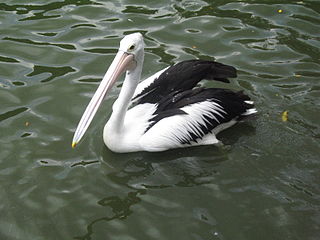
Nicolas Thomas Baudin was a French explorer, cartographer, naturalist and hydrographer, most notable for his explorations in Australia and the southern Pacific. He carried a few corms of Gros Michel banana from Southeast Asia, depositing them at a botanical garden on the Caribbean island of Martinique.
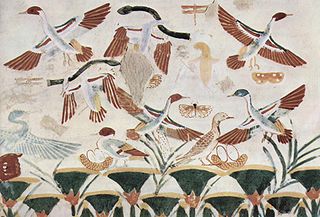
The following is a timeline of ornithology events:

Mathurin Jacques Brisson was a French zoologist and natural philosopher.

The grey-headed chickadee or Siberian tit, formerly Parus cinctus, is a passerine bird in the tit family Paridae. It is a widespread resident breeder throughout subarctic Scandinavia and the northern Palearctic, and also into North America in Alaska and the far northwest of Canada. It is a conifer specialist. It is resident, and most birds do not migrate. Curiously, the bird has no grey on its head, which is black, white, and brown.

Jean-Baptiste Louis Claude Théodore Leschenault de La Tour was a French botanist and ornithologist.
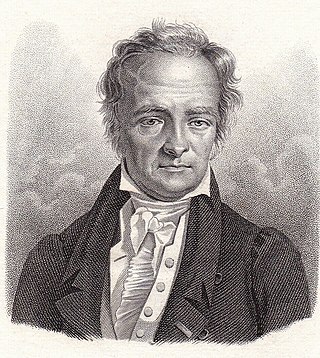
Louis Augustin Guillaume Bosc was a French botanist, invertebrate zoologist, and entomologist.

Charles Alexandre Lesueur was a French naturalist, artist, and explorer. He was a prolific natural-history collector, gathering many type specimens in Australia, Southeast Asia, and North America, and was also responsible for describing numerous species, including the spiny softshell turtle, smooth softshell turtle, and common map turtle. Both Mount Lesueur and Lesueur National Park in Western Australia are named in his honor.

François Auguste Péron was a French naturalist and explorer.
René Maugé was a French zoologist. René Maugé was born in 1757 in Cély-en-Bière, in the Seine-et-Marne department near Paris, France. Nothing is known of his life prior to May 1794. In that month, he started work at the Muséum Nationale d’Histoire Naturelle, Paris, France, learning taxidermy and studying natural history. Maugé was trained by Louis Dufresne (1752-1832) who taught him to skin birds properly. Aged 39, he joined the first government-supported expedition captained by Nicolas Baudin towards Tenerife, St. Thomas, St. Croix and Puerto Rico (1796-1798). The voyage was a success and 296 bird specimens collected by Maugé were brought back; 140+ specimens still survive. Aged 42, he again left with Baudin on a voyage to Tenerife, Mauritius, Australia and Timor with the corvette Le Géographe and the store-ship Le Naturaliste which left Le Havre on 19 October 1800. Maugé was appointed by Antoine-Laurent de Jussieu, director of the MNHN, as one of the official expedition zoologists. He died on board the Le Géographe when it was off the coast of Tasmania on 20 February 1802. He was buried on Maria Island.

The great-billed parrot also known as Moluccan parrot or island parrot, is a medium-sized, approximately 38 cm long, green parrot with a massive red bill, cream iris, blackish shoulders, olive green back, pale blue rump and yellowish green underparts. The female is typically smaller than the male, but otherwise the sexes are similar.
The Baudin expedition of 1800 to 1803 was a French expedition to map the coast of New Holland. Nicolas Baudin was selected as leader in October 1800. The expedition started with two ships, Géographe, captained by Baudin, and Naturaliste captained by Jacques Hamelin, and was accompanied by nine zoologists and botanists, including Jean-Baptiste Leschenault de la Tour, François Péron and Charles-Alexandre Lesueur as well as the geographer Pierre Faure.
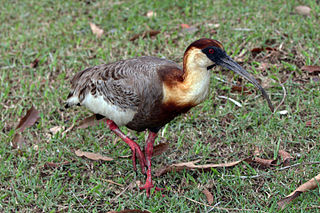
The buff-necked ibis, also known as the white-throated ibis, is a fairly large ibis found widely in open habitats of eastern and northern South America. It formerly included the similar black-faced ibis as a subspecies, but that species is almost entirely restricted to colder parts of South America, has a buff lower chest, and lacks the contrasting large white wing-patches.
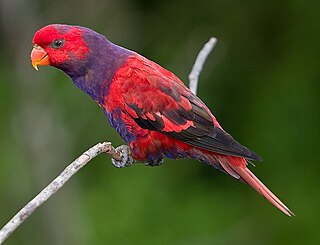
The violet-necked lory is a species of parrot in the family Psittaculidae. It is endemic to Indonesia, where it is found in the northern Maluku Islands and west Papuan islands. Its natural habitats are tropical moist lowland forests and tropical mangrove forests.

The rusty-collared seedeater is a species of bird in the family Thraupidae, formerly placed in the related Emberizidae.

Lepidopterology is a branch of entomology concerning the scientific study of moths and the two superfamilies of butterflies. Someone who studies in this field is a lepidopterist or, archaically, an aurelian.
Jean-Baptiste Bécœur was a French ornithologist.

Nicolas Huet the Younger, aka Nicolas Huet II or as Nicolas Huet le Jeune, was a French natural history illustrator, active 1788–1827.

Leonhard Baldner or Leonard Baltner was a Strasbourg fisherman and naturalist who produced a hand-written illustrated book on the fishes, birds, and mammals titled Vogel-, Fisch- und Thierbuch. Only six manuscript copies are now known to exist, two are dated 1653 and the other four 1666. He was one of the early pioneers to use glass aquariums to study fish in life. He was also possibly the first to write on the migration and life-history of the salmon.















